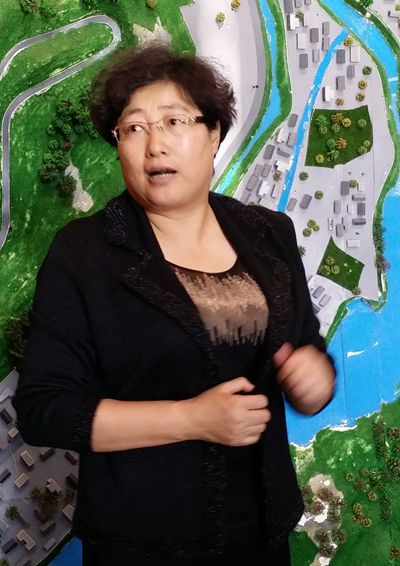

He Lijuan has been realizing her Chinese dream as a grassroots Party chief since 2010, when she first took over the post in Gubeikou town, Beijing’s suburban Miyun county, which has the largest storage facility in north China and Beijing's major water source.
She is just like many other women. She raises her daughter and cares for the elderly in her family with her husband, but she has stood out from thousands of other grassroot officials in Beijing for her resolution and effort in serving the people.
 |
|
He Lijuan [Photo provided to chinadaily.com.cn] |
In the eyes of residents in Gubeikou town, He Lijuan is the most beautiful grassroots official in China, since she has devoted so much to improving their lives and taken their welfare as her top priority.
Most of her time is spent on visiting villagers and talking with them, aiming to know more about their concerns and troubles.
Early in 2010, He Lijuan noticed that some peasants increased their income by developing folk tourism based on the unique tourism resources in the town, such as the Simatai Great Wall, ancient villages and beautiful landscape around the Miyun reservoir.
She also found that few of them achieved sustainable development due to lack of planning and management. At that moment, she felt an obligation to make changes.
At that time, she conducted enormous field surveys, visiting different villages to seek good advice, as well as consulting people from all walks of life, especially her superiors and experts who specialized in folk tourism.
Then, a proposal on developing Gubeikou into an international cultural tourism town was made after comprehensive research and investigation.
Approved by the local government, He Lijuan’s proposal became a guideline for the town’s growth. It was only the first step in realizing her dream.
A group of projects, including a new folk town, was expected to start construction soon.
However, she did not foresee all the difficulties ahead. The main obstacle was the relocation of Simatai villagers.
Because of the new construction projects, residents in Simatai had to move out of their own homes and live in new houses near Simatai. It seemed a mission impossible for He Lijuan.
She called more than 100 meetings and communicated directly with villagers in 30 meetings. Based on the information from those meetings, she solved over 300 compensation problems and provided suggestions on relocation policies.
She also learned that the relocation work called for much patience and understanding for every villager involved. She began to draft an open letter and more considerate policies for the residents in Simatai.
In addition, He Lijuan visited the village time and time again to explain the policies in detail. She once went to a villager’s home eight times to eliminate his worries.
She could hardly speak after talking all day long when she received a phone call at that time. Her father came a long way to see her and gave suggestions on her work.
Her daughter missed her so much since He Lijuan had been busy working for the villagers’ relocation and she had not seen her mother for many days. The girl also lent her mother a helping hand recording and collecting information in the village.
She won the trust of villagers with her sensitivity and consideration. A total of 1,131 villagers from 502 families were successfully moved out of 393 country yards and 4,000 houses in just 20 days. And all of them were relocated to their new homes within 50 days.
Since the beginning of 2014, the total amount of domestic and international tourists visiting the new folk town has reached 400,000, bringing an income of 66.7 million yuan ($10.8 million).